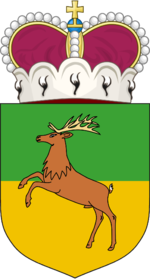Parliament of Caudonia
Parliament of Caudonia Parlament Kaudónske | |
|---|---|
| 10th Parliament | |
 | |
| Type | |
| Type | |
| Houses | Senate House of Assembly |
| History | |
| Founded | 5 July 2019 |
New session started | 4 September 2021 |
| Leadership | |
Monarch | William I since 5 July 2019 |
Speaker | Elliot Doe, Democratic Traditionalist Party since 3 November 2021 |
Prime Minister | Robert Smith II, Labour Unionist Party since 4 September 2021 |
Leader of the Opposition | Caden Mesanko, Tea Party since 4 September 2021 |
| Structure | |
| Seats | 10 |
 | |
House of Assembly political groups | Government:
Opposition: |
| Elections | |
House of Assembly voting system | Party-list proportional representation |
House of Assembly last election | August 2021 |
House of Assembly next election | December 2021 or sooner |
| Meeting place | |
| Discord | |
The Parliament of Caudonia (Slovak: Parlament Kaudónske; Scots: Pairlament o Caudonie) is the bicameral legislature of Caudonia, consisting of the Prince of Caudonia, the Senate, and the House of Assembly.
The Parliament is closely linked to the executive. The Government of Caudonia comprises a prime minister (head of government) and other ministers. In accordance with the principle of responsible government these individuals are always drawn from Parliament and held accountable to it.
Unlike most other constitutional monarchies, the Monarch participates in the legislative process in Caudonia. The Monarch has the power to write and propose bills to the parliament, and to grant royal assent to bills.
History
Westminster model
The Parliament of Caudonia is consciously modelled on the Westminster system of parliamentary representation, developed in the United Kingdom. This system can be traced back to the "Model Parliament" of 1295.
Over the centuries, parliaments progressively limited the power of the monarchy. The Bill of Rights 1688 from England established Parliament's role in law-making, taxation, and supply. Among its provisions, the Bill confirmed absolute freedom of speech in Parliament (see parliamentary privilege). Caudonia has adopted some of these provisions for its system of government.
Establishment
The Parliament of Caudonia was created by the Constitution of Caudonia, which was ratified on 5 July 2019. It established a unicameral legislature with one house known as the Legislative Assembly.
Upper houses
The first upper house, known as the Legislative Council, was established on 12 October 2019. It consisted of five members appointed by the Prince. It was short lived and only saw one member appointed. On 2 January 2020, following the Prince's announcement of constitutional reform, it was abolished. A second upper house, known as the Senate, was established following the fifth constitutional amendment coming into force on 24 May 2020. This amendment also renamed the Legislative Assembly to House of Assembly.
The Senate is not currently being used as there is not much demand for it.
Monarch
The Monarch, formally known as the Prince-in-Parliament, is the highest member in Parliament. Unlike most other constitutional monarchies, the Monarch participates in the legislative process. He has the power to write and propose bills, and grant princely assent to bill in order to make them law.
Houses
House of Assembly
The House of Assembly was established as the sole house of Parliament in 2019. It currently consists of 15 Members of the House of Assembly (MHAs), elected to a four-month term. Parliamentary elections use a party-list proportional representation system. These MHAs assemble to represent the people, pass laws and supervise the work of government. Members also form select committees, appointed to deal with particular areas or issues.
Senate
The Senate was established following the fifth constitutional amendment coming into force on 24 May 2020. It is currently not in use.
Terms of Parliament
Parliamentary terms typically do not last more than four months.
List of terms of Parliament
Parliament is currently in its 10th term.
| Term | Elected in | Government |
|---|---|---|
| 1st Parliament | July 2019 | First Social Democratic |
| 2nd Parliament | October 2019 | First Populist Conservative |
| 3rd Parliament | November 2019 | Second Social Democratic |
| 4th Parliament | March 2020 | Third Social Democratic (in coalition) |
| 5th Parliament | May 2020 | First Caudonian Front (in coalition) |
| 6th Parliament | September 2020 | Fourth Social Democratic (in coalition) |
| 7th Parliament | January 2021 | First National (in coalition) |
| 8th Parliament | April 2021 | Fifth Social Democratic (in coalition) |
| 9th Parliament | June 2021 | First Liberal (in coalition) |
| 10th Parliament | August 2021 | First Labour Unionist (in coalition) |
Passage of legislation
Before any law is passed, it is first introduced in one of the two houses as a draft known as a bill. Once all members present have had a chance to read the bill, the Parliament may decide if it wants to recommend any revisions to the bill or vote on it. Once a vote has been decided on, a bill must receive approval from a majority of MPs. Once a bill has been approved by Parliament, it is passed to the Prince who will either grant or deny royal assent.